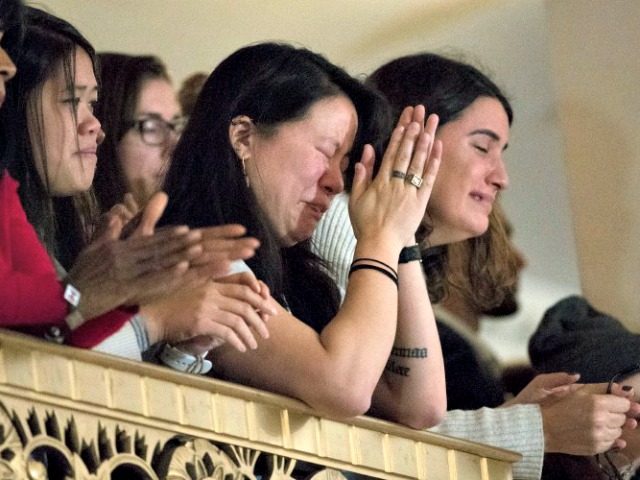Young Democrat voters are “more likely to despise the other party,” a poll released by Axios on Tuesday found.
According to the report, Democrats are “far more likely to dismiss people than Republicans.” The poll found that 71 percent of Democrats would not go on a date with someone who holds opposing views, 37 percent would not be friends with a Republican, and 30 percent would not work for someone with a different voting history.
“Why it matters: Partisan divides — as each side inhabits parallel political, cultural and media universes —make a future of discord and distrust in the U.S. all the more likely,” Axios wrote. The study was conducted November 18-22 with 850 students nationwide from two-year and four-year schools, and the margin of error is +/- 3.4 percentage points.
In contrast, only 31 percent of Republicans said they would refuse to date someone from the opposite party, and just five percent said they would not be friends with a Democrat. Seven percent of Republicans said they could not work for someone from the opposite party.
Apart from politics, women are less likely than men to date someone with a differing viewpoint, 41 percent to 67 percent. Women are also less likely than men to work for a boss who voted for a different candidate, 76 percent to 86 percent. Men are more likely than women to support businesses that have differing viewpoints, 84 percent to 68 percent.
The poll results can be contextualized by a 2020 survey from the libertarian Cato Institute which found that 62 percent of Americans — and 77 percent of Republicans — were afraid to share their political views. Even a majority of Democrats (52%) reported being afraid to share their views. According to the 2020 poll report:
A new Cato national survey finds that self‐censorship is on the rise in the United States. Nearly two-thirds—62%—of Americans say the political climate these days prevents them from saying things they believe because others might find them offensive. The share of Americans who self‐censor has risen several points since 2017 when 58% of Americans agreed with this statement.
Strong liberals stood out, however, as the only political group who felt they could express themselves. Nearly six in ten (58 percent) of staunch liberals said they felt they could say what they believe.

COMMENTS
Please let us know if you're having issues with commenting.